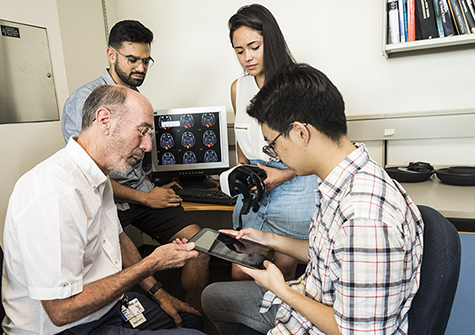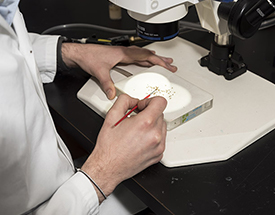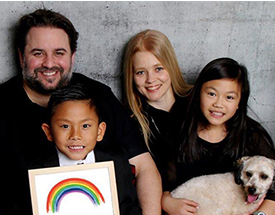- Accueil /
- À propos de nous /
- Rapports annuels /
- Rapport annuel 2021 /
- Développement des affaires

RAPPORT ANNUEL DE L’IR-CUSM 2021
DÉVELOPPEMENT DES AFFAIRES
RECONVERTIR UN MÉDICAMENT POUR TRAITER LA COVID-19

Le syndrome de détresse respiratoire aiguë est la première cause de décès chez les patients atteints de la COVID-19. Les thérapies standardisées pour atténuer la détresse respiratoire chez les patients atteints de la COVID-19 sont toutefois insuffisantes. Pour pallier ce besoin urgent, la Dre Elena Netchiporouk, chercheuse du Programme en maladies infectieuses et immunité en santé mondiale à l’Institut de recherche du Centre universitaire de santé McGill (IR-CUSM), a mené une étude innovatrice pour déterminer si un médicament existant pouvait servir de traitement pour les patients atteints de la COVID-19.
La Dre Netchiporouk, chercheuse-clinicienne dans la Division de dermatologie du Centre universitaire de santé McGill (CUSM), a mis à profit ses connaissances sur les maladies auto-immunes touchant la peau et a estimé qu’un tel traitement pourrait être la clé du succès pour traiter les patients atteints de la COVID-19 éprouvant de la détresse respiratoire. À cette fin, son équipe multidisciplinaire et elle ont entamé un essai clinique pour déterminer si l’omalizumab, un médicament approuvé pour traiter les patients aux prises avec l’asthme sévère, représente un moyen plus efficace de traiter les patients hospitalisés atteints de la COVID-19 que la norme de soins actuelle.
La Dre Netchiporouk a travaillé en étroite collaboration avec le Bureau du développement des affaires de l’IR-CUSM pour obtenir du financement pour cet essai clinique innovateur. Ce partenariat a mené à l’acquisition de financement de recherche du ministère de l’Économie et de l’Innovation du gouvernement du Québec ainsi que de la Fondation du CUSM. Ce financement permettra ultimement l’évolution de cette idée potentiellement révolutionnaire en une réalité clinique.
UNE THÉRAPIE NUMÉRIQUE POUR RESTAURER LA VUE
Imaginez une enfance désavantagée en raison de la perte de vision dans un œil, pour laquelle la norme de traitement constitue de porter un cache-œil sur l’œil le plus fort dans le but de renforcer l’œil le plus faible. Telle est la réalité de trois à quatre pour cent de la population souffrant d’amblyopie, communément appelée « l’œil paresseux ». Bien que le cache-œil soit prometteur chez les enfants, il constitue un traitement désorientant truffé de défis en matière d’observance et il est inefficace chez les adultes.
En tentant de dénouer les circuits du cerveau sous-jacents à l’amblyopie, Robert Hess, Ph. D., du Programme en réparation du cerveau et en neurosciences intégratives (RCNI) à l’Institut de recherche du Centre universitaire de santé McGill (IR-CUSM), a proposé une idée révolutionnaire. « Peut-être la perte de vision n’est-elle pas la cause de la maladie », explique le chercheur senior, « mais plutôt la conséquence des deux yeux qui sont incapables de travailler ensemble. »
Encourager le « travail d’équipe oculaire » engendre des améliorations visuelles supérieures

La recherche de Robert Hess a déterminé qu’encourager le « travail d’équipe oculaire » engendre des améliorations visuelles supérieures et de plus grands avantages concrets qu’uniquement se concentrer sur l’œil le plus faible. Afin de concrétiser ces découvertes, ses collègues du programme RCNI et de McGill, Alex Baldwin, Ph. D., et Alexandre Reynaud, Ph. D., et lui ont permis à Amblyotech, une entreprise en démarrage, d’utiliser leur travail breveté dans le but de développer un jeu vidéo qui pourrait traiter l’amblyopie chez les enfants et les adultes. Comme publié en 2018, cette collaboration a mené à la production d’une version du jeu Tetris, qui encourage les yeux à travailler ensemble. Dans le cadre du jeu, l’œil le plus faible ne voit que les blocs qui tombent, alors que l’œil le plus fort ne voit que les espaces sur lesquels les blocs atterrissent.
En 2020, Novartis a fait l’acquisition d’Amblyotech, la première thérapie numérique au sein du vaste portefeuille thérapeutique de ce géant pharmaceutique. Tout comme les pharmacothérapies traditionnelles, les thérapies numériques exigent des analyses cliniques et réglementaires rigoureuses. Pour faciliter le transfert de cette technologie en traitement unique pour les patients atteints d’amblyopie, les bureaux du développement des affaires et des contrats de l’IR-CUSM ont engagé des discussions et négocié des contrats de recherche, nouant des liens de collaboration fructueux entre Novartis et les chercheurs de l’IR-CUSM.
Nouvelles sélectionnées
- Lire le communiqué de presse de Novartis en 2020 (en anglais uniquement)
- Les travaux de Robert Hess sont présentés à la page 15 du Rapport annuel de l’IR‑CUSM 2017-2018


